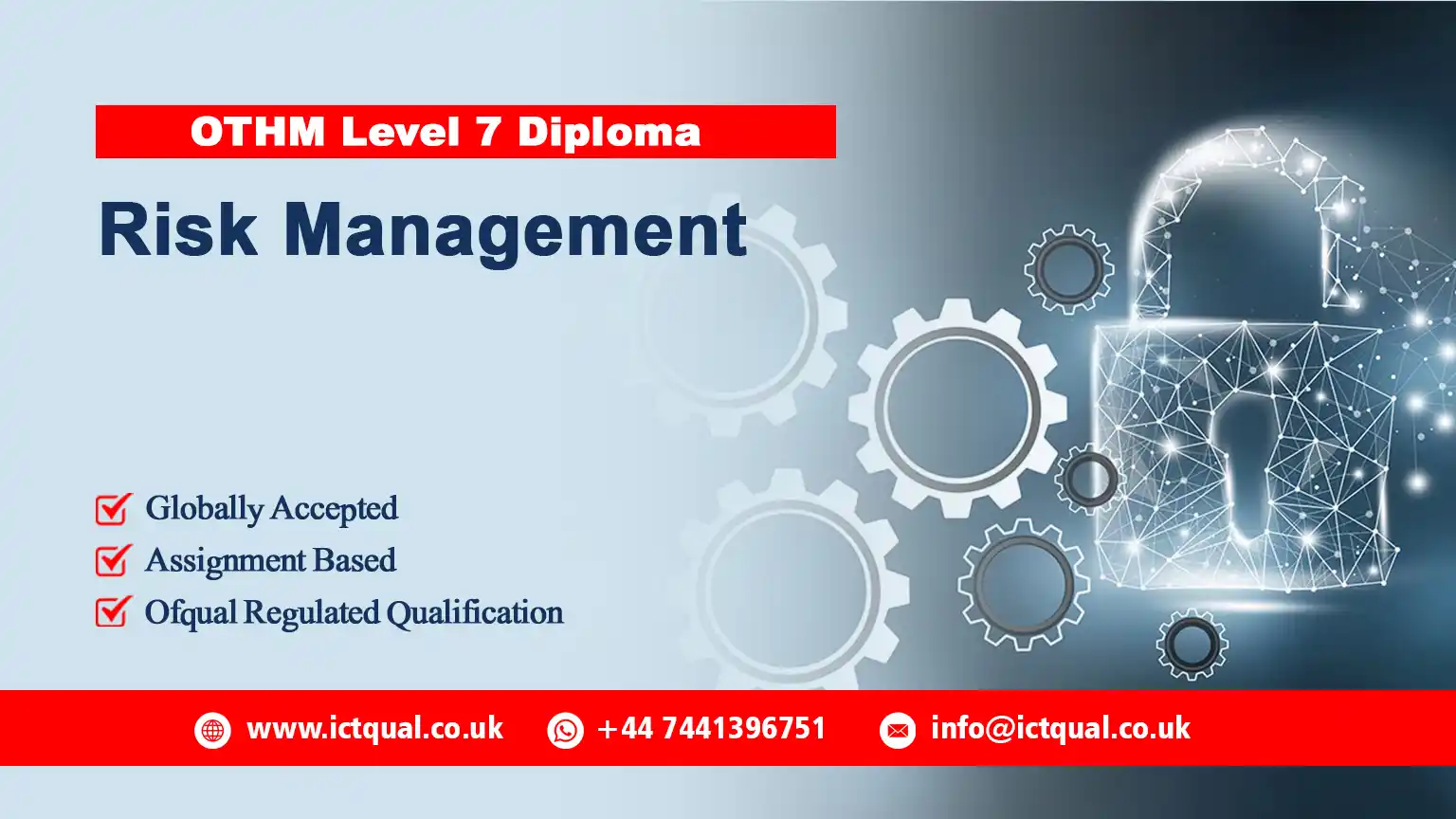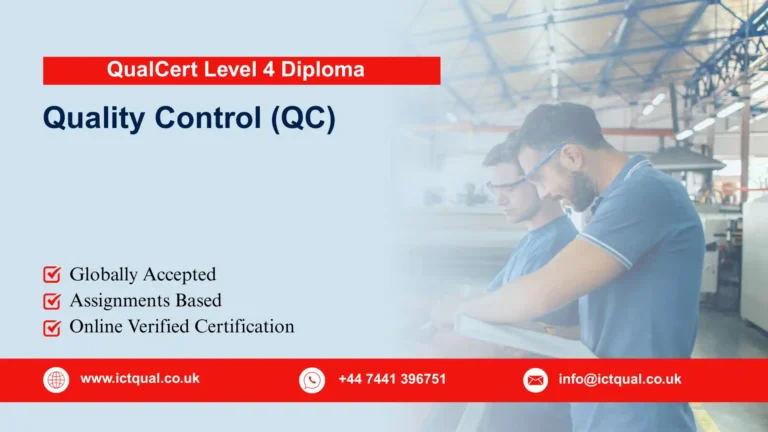In today’s dynamic business environment, effective risk management is critical for organizational success and sustainability. The OTHM Level 7 Diploma in Risk Management is designed for professionals who aspire to master the art of risk management and lead their organizations through complex challenges and uncertainties.
Risk management is the process of identifying, assessing, and mitigating risks to achieve organizational objectives. The OTHM Level 7 Diploma delves into the fundamentals of risk management, covering topics such as risk analysis, risk assessment methodologies, risk appetite, and risk treatment strategies. Participants gain insights into the various types of risks that organizations face, including financial, operational, strategic, and compliance risks, and learn how to develop tailored risk management approaches to address them.
The OTHM Level 7 Diploma in Risk Management offers an advanced, in-depth exploration of risk management principles and practices. This prestigious qualification is ideal for those looking to enhance their expertise in identifying, analyzing, and mitigating risks that can impact organizational performance. Whether you are in a senior management role or looking to advance to one, this diploma provides the critical skills needed to manage risks effectively and strategically.
The OTHM Level 7 Diploma in Risk Management emphasizes practical application through real-world case studies and exercises. This hands-on approach allows you to apply theoretical knowledge to actual risk scenarios, developing actionable solutions to address contemporary challenges. Additionally, the program offers a global perspective, preparing you to manage risks in diverse and international contexts.
The OTHM Level 7 Diploma in Risk Management offers a comprehensive and practical approach to mastering risk management. Through a blend of theoretical knowledge, practical skills development, and real-world applications, participants gain the expertise needed to navigate the complexities of risk management effectively. If you’re passionate about mitigating risks and safeguarding organizational success, consider enrolling in this diploma program and embark on a rewarding journey towards becoming a trusted risk management professional.
Delivery Method is Blended (Online and Distance Learning)
The OTHM Level 7 Diploma in Risk Management is an advanced qualification designed to provide senior professionals with a thorough understanding of risk management principles and practices. This diploma equips participants with the expertise required to navigate and mitigate complex risks, ensuring organizational resilience and strategic success in today’s ever-evolving business landscape.
The course offers a comprehensive exploration of risk management, covering key areas such as risk assessment, analysis, and mitigation. Participants will gain proficiency in identifying potential risks, evaluating their impact, and implementing effective strategies to manage and control these risks. The curriculum emphasizes the integration of risk management into strategic planning and decision-making processes, ensuring that risk considerations are aligned with organizational goals and objectives.
A significant component of the program is dedicated to understanding and applying regulatory and compliance frameworks relevant to risk management. This ensures that participants are well-versed in the legal and regulatory requirements that affect risk management practices, helping to maintain organizational compliance and mitigate legal risks.
The diploma also addresses crisis management and organizational resilience, equipping learners with the skills to prepare for, respond to, and recover from adverse events. This aspect of the course focuses on building the capability to handle crises effectively and adapt to unforeseen challenges.
Practical application is central to the OTHM Level 7 Diploma in Risk Management. The course incorporates real-world case studies and exercises, allowing participants to apply theoretical knowledge to practical risk scenarios and develop actionable solutions. Additionally, the program provides a global perspective, preparing professionals to manage risks in diverse and international contexts.
By completing the OTHM Level 7 Diploma in Risk Management, professionals will enhance their ability to lead risk management initiatives, ensure organizational stability, and contribute to strategic success. This qualification is highly regarded across industries and offers flexible learning options to accommodate the needs of busy professionals. Enroll in the OTHM Level 7 Diploma in Risk Management to advance your career and gain the advanced skills necessary for effective risk management and leadership.
The OTHM Level 7 Diploma in Risk Management qualification consists of 6 mandatory units for a combined total of 120 credits, 1200 hours Total Qualification Time (TQT) and 600 Guided Learning Hours (GLH) for the completed qualification.
Mandatory Units
| Sr# | Unit Title | Credit Hours |
|---|---|---|
| 1 | Principles of Risk Management | 20 |
| 2 | Strategic Risk Management | 20 |
| 3 | Responsible Leadership and Governance | 20 |
| 4 | Organisational and Environmental Risk | 20 |
| 5 | Risk Analysis and Modelling | 20 |
| 6 | Advanced Research Methods | 20 |
The course is suitable for professionals and individuals interested in advancing their knowledge and expertise in risk management. Specifically, it caters to:
1. Senior Risk Managers and Analysts
- Professionals responsible for identifying, assessing, and mitigating risks
- Staff managing organizational risk frameworks and compliance programs
- Individuals aiming to enhance strategic risk management skills
- Leaders monitoring operational, financial, and strategic risks
- Professionals seeking a recognized Level 7 OTHM qualification
2. Executives and Senior Leaders
- CEOs, directors, and senior management overseeing organizational strategy
- Leaders aiming to integrate risk management into business planning
- Executives responsible for enterprise-wide risk governance
- Professionals seeking to improve decision-making in complex environments
- Senior leaders wanting advanced accreditation in risk management
3. Compliance and Governance Officers
- Professionals ensuring organizational compliance with regulations
- Staff monitoring risk policies, audits, and regulatory reporting
- Individuals aiming to strengthen governance and internal controls
- Compliance officers seeking internationally recognized qualifications
- Professionals responsible for risk assessments and mitigation strategies
4. Project and Programme Managers
- Managers overseeing high-value or complex projects
- Professionals aiming to incorporate risk management into project planning
- Staff responsible for identifying potential risks and implementing mitigation strategies
- Leaders looking to improve project success rates through risk control
- Project managers seeking Level 7 accreditation to advance their career
5. Consultants and Advisors
- Risk management consultants advising organizations on strategy and compliance
- Professionals providing expert guidance on operational, financial, and strategic risks
- Advisors aiming to enhance credibility with an OTHM Level 7 qualification
- Consultants seeking advanced knowledge to deliver measurable results
- Specialists aiming to improve enterprise risk frameworks for clients
6. Business Owners and Entrepreneurs
- Entrepreneurs managing organizations exposed to operational or financial risks
- Business owners aiming to implement robust risk management strategies
- Leaders seeking to protect assets and minimize organizational vulnerabilities
- Professionals wanting to enhance business continuity and resilience planning
- Owners aspiring to a recognized qualification to boost credibility
7. Students and Graduates in Risk or Management
- Graduates preparing for careers in risk management, compliance, or finance
- Students aiming to gain advanced risk management knowledge
- Individuals seeking internationally recognized Level 7 certification
- Learners wanting practical skills applicable to corporate and organizational risk
- Students aiming to enhance career opportunities in leadership or advisory roles
Learning outcomes for OTHM Level 7 Diploma in Risk Management
Principles of Risk Management
- Understand risk management principles.
- Understand key legislation frameworks that influence risk management decision making in an organisation
- Evaluate the scope and implications of risk management standards.
Strategic Risk Management
- Understand the concept of strategy risk and various types of strategy risk.
- Be able to review an organisation’s strategy and risk plans.
- Understand the role of Corporate Social Responsibility and ethics in risk management systems.
- Understand the development, implementation and role of Business Continuity Planning with regard to corporate strategy
Responsible Leadership and Governance
- Understand the key sociocultural, ethical and moral issues that affect organisations in the current economic environment.
- Understand the role of leadership to manage strategic and operational risk in the organisation.
- Understand the importance of corporate governance in organisations.
- Understand the role and impact of corporate governance in the management of companies.
Organisational and Environmental Risk
- Understand the effects of risks on business organisations.
- Understand risk management function in organisations.
- Be able to prepare an effective risk management plan followed by an environmental screening.
- Understand risk control techniques.
Risk Analysis and Modelling
- Understand the concept of operational risk and Basel II model.
- Understand how to apply risk models to an organisational context.
- Be able to apply financial models to an organisational context.
Advanced Research Methods
- Be able to develop research approaches within a risk management context
- Be able to critically review literature on a relevant risk management topic
- Be able to design research methodologies.
- Be able to develop a research proposal.
Register Now
Fee Structure for OTHM Level 7 Diploma in Risk Management
Future Progression
Completing the OTHM Level 7 Diploma in Public Administration qualification empowers learners to advance their careers or further their studies. This qualification enables learners to pursue relevant master’s top-up programs with advanced standing at numerous universities in the UK and overseas.







